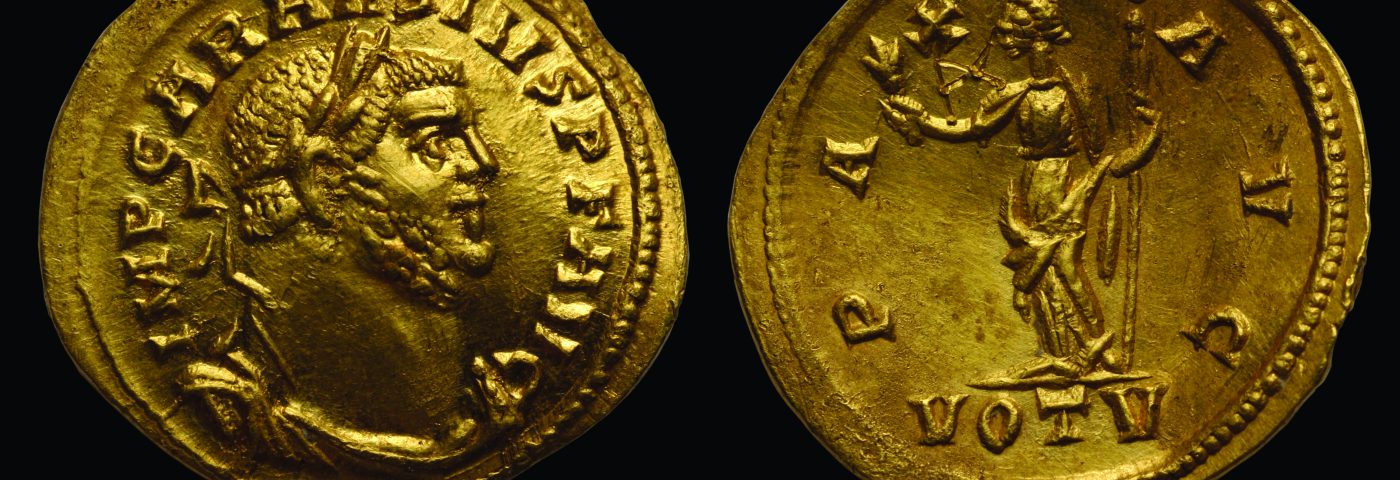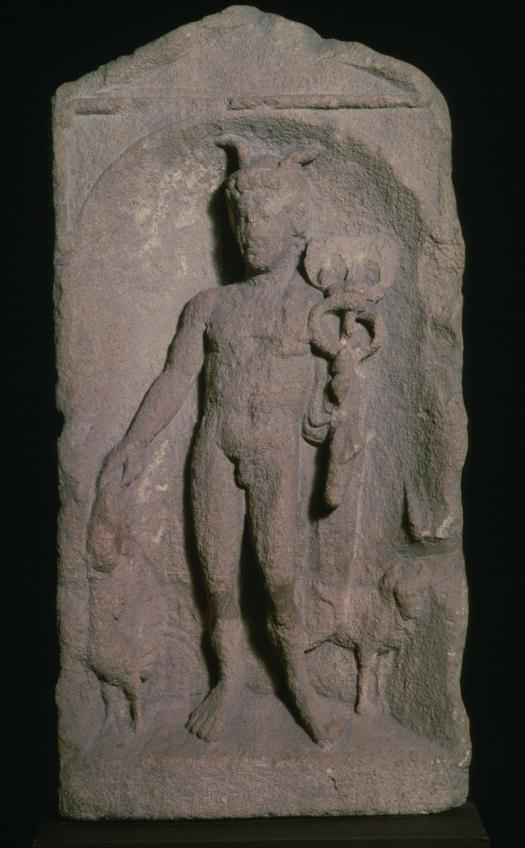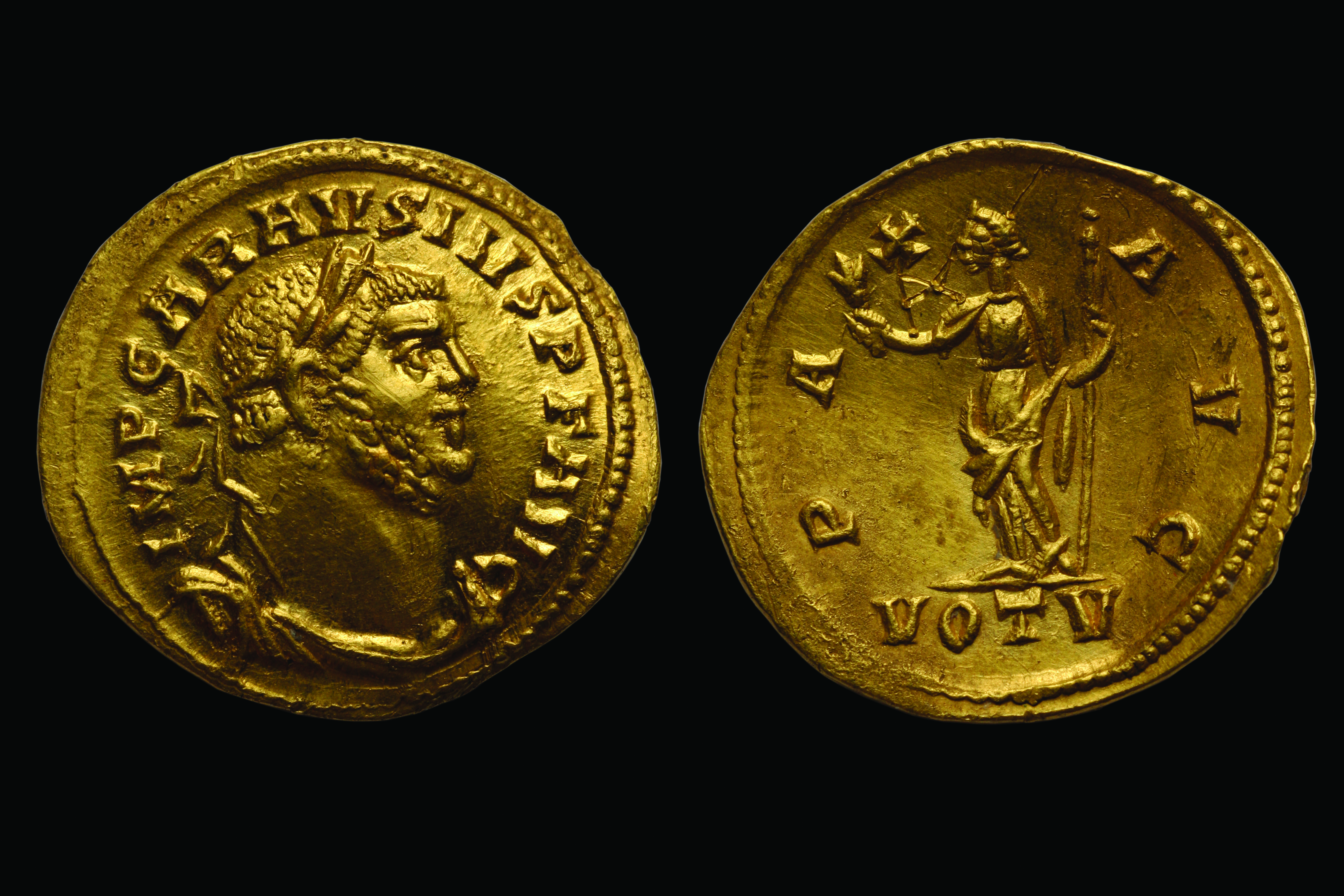Blog post by Samantha Fryer Ward
In the Corinium Museum there are many artefacts linked to Roman and pre-Roman gods and goddesses. These range from the small statue of Lar, a guardian deity that would have been placed in a household shrine, to the stone carvings of the Romano-Celtic mother goddess and the hooded figures of the Genii Cucullati, and the many references in mosaics, paintings and sculpture to Bacchus, the Roman god of agriculture, wine and fertility.
One of major gods referenced in Roman Corinium was Mercury. Many altars and figurines of the god have been found in Cirencester. A stone relief of Mercury is on display in the museum, where he is shown with his winged hat and shoes, which represent his role as messenger of the Gods, he has a goat or ram, which represents fertility, and his herald staff.
Perhaps, as the god of travellers, merchants and trade (mercari means to trade in Latin and merces means wages) Mercury was important to Corinium because two important roads, the Fosse Way and Ermin Street, crossed in the town. The Romans would have made offerings to Mercury to ask for a safe journey or prosperous trading. Indeed, historians believe that a statue of Mercury may have been placed over the Bath Gate in the town.
Coining a reputation
Mercury was also known as the God of thieves and trickery, which is not necessarily something travellers and traders would want to encourage. But this can, perhaps, link to a real-life Roman who, while he may never have visited Corinium, played an incredible and largely forgotten role in British history.
Most people in the UK will know about emperors such as Hadrian and Nero and their impact on Britain. But not many would have heard of Carausius until about 10 years ago, when a hoard of 52,000 Romano-British coins was found near Frome in Somerset. Nearly 800 of these were minted during the reign of Carausius, between AD286 and AD293, when he declared himself Emperor of Britain after leading a revolt against Rome. There is a gold aureus coin in the Corinium Museum’s collection that bears his image, which shows a thick-necked, full-bearded figure who looks almost “thug-like”.
At the time of the Frome find, Roger Bland, head of portable antiquities for the British Museum, said:
“This find presents us with the opportunity to put Carausius on the map. School children across the country have been studying Roman Britain for decades, but have never been taught about Carausius – our lost emperor.”1
From stopping pillage to seizing power
How can Mercury be linked to Carausius? From what is recorded about our lost emperor, it appears that he may well have achieved his position through thievery and trickery.
According to the Encyclopaedia Britannica2, Marcus Aurelius Mausaeus Carausius was born in what is now Belgium. He was a merchant sailor who rose to become a Roman officer during the time when Rome was trying to crush the revolts in north-eastern Gaul.
Carausius came to the attention of the co-ruling emperors Maximian and Diocletian during the war against the Bagaudae. They tasked him with commanding a fleet to patrol the seas around northern Europe to stop pirates from plundering the coast around Gaul. He was highly effective, but there were suggestions that he may either have been keeping some of the loot for himself or that he was actually in league with the pirates. The term mercenary, the Latin root of which is linked to Mercury, may also be appropriate to apply to Carausius at this stage in his career!
Maximian ordered him to report to Rome for court martial. Carausius refused and Rome then decreed he should be hunted down. The fleet declared their loyalty to Carausius and he withdrew to Britain where he proclaimed himself the third emperor. He defeated an attempt by Maximian to dislodge him and until around AD293, when he was assassinated by his finance minister Allectus, Carausius ruled Britain.
Carausius’s downfall may be in part due to the increasingly mercurial nature of his rule (the term originally meant relating to the god Mercury). According to an article by Alan Clayson in The Independent3, towards the end of his life
“discernible general disorder and a constant flux of alliances and factions were fuelling the notion that Carausius, once the subject of terrified admiration, was not merely fallible but out of control”.
Trade and travel still helping the town to prosper
Back to today and the gate over which Mercury presided is long gone and Cirencester residents no longer make offerings to this Roman god of trade and travel. But Cirencester through the ages has remained a place where trade has prospered, thanks to the town’s thriving wool market. And Cirencester certainly welcomes many travellers, as tourism is now one of the most important industries in the town.
1 https://www.reuters.com/article/us-britain-coins/big-roman-coin-hoard-found-in-britain-idUSTRE66733F20100708
2 https://www.britannica.com/biography/Marcus-Aurelius-Mausaeus-Carausius
3 https://www.independent.co.uk/life-style/history/ahead-of-his-time-carausius-was-a-pirate-a-rebel-and-the-first-ruler-of-a-unified-britain-2039008.html












